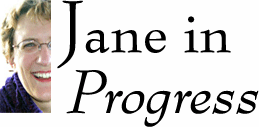 |
|
 |
 |
Looking for tips and tricks to the art of writing for television? Welcome to the blog of experienced television writer Jane Espenson. Check it out regularly to learn about spec scripts, writing dos and don'ts, and what Jane had for lunch! (RSS:  ) |
|
|
Home » Archives » June 2008 » Dishing it Out
[Previous entry: "On a Dime"] [Next entry: "We Don't All Have ESP in Our Names"]
06/24/2008: Dishing it Out
Gentle Reader Victoria in England writes in with a great observation about bad writing. Ooh good, I love complaints about bad writing. Here's what she's talking about:
One thing that particularly stands out is when a scene calls for a lot of exposition, and the writer has obviously chosen to write one long paragraph of dialogue and then randomly dish out sentences to different characters. It ends up sounding as though the characters are delivering a presentation to each other, having agreed in advance what they are going to say.
She goes on to ask about how to avoid this problem as writer. Well, first allow me to blush. Because before I got this letter, I'd've been far too ready to actually recommend this technique as a clever way to break up long bits of exposition delivered by a single character. Farm it out around the room and you can disguise it, I'd've said. But, of course, Victoria is right. Doing this runs the risk of exactly what she's talking about -- it sounds like one of those grade school performances in which each child's been assigned a different line of the poem to read out loud.
The problem is a tricky one and the best solution is probably to avoid getting into this situation at all -- parse the exposition out over more scenes, or let characters (and the audience) be less-well informend -- they'll pick it up as they go, which is often more interesting anyway.
But let's suppose there's no choice. Five people know a bunch of stuff and a sixth guy walks in and you simply have to have a big explain-o-fest.
Well, you can try using this as an opportunity to highlight your characters. Got someone impatient? Have them interrupt the explanation and take it over. Got two characters who don't like each other? Have them compete to be the one to deliver the information -- talking over each other. Got a natural leader? Show the others automatically deferring to her to sum up the info. This kind of thing can be big and overt, or you can just subtly use stage directions to indicate some pointed looks and eye-rolls that will let your reader see how the scene would be played.
I would also consider giving the characters different opinions on what happened. I don't just mean different opinions on what do next, but different interpretations of what they already know. Like this:
JULIAN
Then the alien started talking about how we're all gonna die--
HEATHER
Wait-- it wasn't a threat. It was a warning. Wasn't it?
JULIAN
It was a threat.
You can also have the characters learn new information in the process of relating it, instead of preparing them with all of it in advance:
KELLY
If we don't get the sprinkler system back on line, the whole place is gonna go up!
SHEILA
At least it'll only take out the one building.
MARGARET
(looking up from computer)
You're wrong. Their system's been hit, too. The whole neighborhood could go.
All you have to do is hold back some little bit for them to find and it becomes a much better scene.
The first step is realizing you have a problem scene. Thanks to Victoria for pointing it out!
Lunch: chopped salad with warm chicken (And many thanks to Anthony in Oregon who sends along a delicious-looking recipe for a spinach-strawberry salad with a much more appealing dressing than the one I've been dealing with here. Thanks, Anthony!)
|
|
|
 |
|
Get Blog Updates Via Email
|
|
 |

